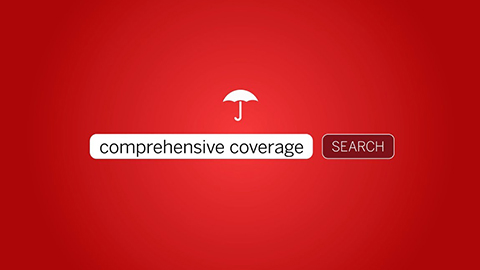Claim Insurance Dictionary
Actual cash value (ACV)
The estimated value of the item lost or damaged based on its condition immediately prior to the loss. This is typically calculated as replacement cost value minus depreciation.
Deductible
The dollar amount or portion of a covered loss that is your responsibility as the policyholder. For example, if your policy includes a $1,000 deductible, you will be required to pay that amount toward the repair of the damages or that amount will be deducted from the claim payment sent directly to you.
Depreciation
Your home, its contents or your vehicle may lose value over time due to factors such as age, wear and tear, and obsolescence. When Travelers is determining the value of your vehicle, depreciation will be among the factors considered.
Collision vs. comprehensive coverage
Collision coverage helps pay for damage to your vehicle if it hits another car or object, is hit by another car or rolls over. Comprehensive coverage helps pay for damages to your vehicle that are not caused by a collision. Examples include theft, vandalism, glass-only damage, hitting a deer or other animal, storms and certain natural disasters.
Investigation
As part of our standard process, we may review the details of your accident, contact witnesses and assess the damages.
Liability coverage
If you cause an accident, your policy may provide compensation to other parties or pay for your legal expenses if you are sued. This coverage is required in most states.
Loss of use coverage/additional living expenses (ALE)
Your policy may pay your Additional Living Expenses (ALE), the necessary increases in your normal day-to-day expenses that you incur if your property is determined to be uninhabitable due to a loss covered under your policy. Loss of use coverage may be available only for the period of time reasonably required to make your home habitable or, if a replacement home is purchased, the time reasonably required for you to move in.
Mortgagee
If you have a mortgage (or other similar lien) on your property, the mortgage company (or mortgagee) has a financial interest in your property. Claim payments related to building damage or losses are typically required to be made out to you and the mortgagee. Your mortgage company may require documentation that the repairs have been performed before endorsing the check. Contact them as soon as possible to learn their requirements to avoid delays.
Personal property
Property you would be able to take with you if you were to move. This generally means items that are not bolted down or permanently installed (e.g., clothing, furniture).
Policy limits/sublimits
Depending on your homeowners policy’s limits, it may not reimburse you for the full amount of your loss. And items such as jewelry, silverware, coins or cash may need to be insured using specific endorsements or separate policies. You’ll also want to revisit your policy annually to make sure that it provides sufficient coverage to rebuild your home. Over time, economic changes (such as labor or material costs) could increase the cost.
Reconstruction costs
Your dwelling policy limits are based on the estimated cost of rebuilding your home, but over time, economic changes (such as labor or material costs) could make rebuilding more expensive than initially anticipated. You’ll want to revisit your policy annually to make sure that it provides sufficient protection.
Replacement cost value (RCV)
If you have this coverage and elect to fully repair or replace your damaged property, you will be reimbursed for the cost. Your policy may limit the maximum dollar amount payable.
Rental coverage
If your car is damaged during an accident, this coverage may pay all or a portion of the costs associated with renting alternative transportation.
Roadside assistance/towing
This coverage provides services such as a jump-start, fuel delivery, changing of a flat tire, lockout assistance or towing after a mechanical breakdown. Depending on your policy coverages, there may be charges for which you will be responsible.
Subrogation
If a person or company is responsible for the damage to your property, Travelers may seek reimbursement from that person or entity, or an insurance carrier, which could result in the reimbursement of some or all of your deductible.
Total loss
When a vehicle is considered unsafe to use or damaged beyond economic repair.
Related Articles
What Is Loss of Use?
If a covered hazard forces you out of your home, Travelers may compensate you for additional living expenses.

What Is Comprehensive Coverage?
This covers non-collision related damage to your vehicle, such as theft or fire, as well as striking an animal or a tree falling on your car in a storm.

What Is Depreciation in Insurance Claims?
Learn how we calculate depreciation and how to submit a request for recoverable depreciation.

Additional Resources
Check your claim status
Find out where you are in the claim process.
Claim next steps
Find out what you can expect after filing your claim.
Claim guide library
A collection of materials designed to help you navigate the claim process.